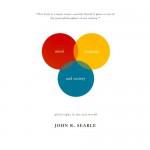
NEWS: Chatbots.org survey on 3000 US and UK consumers shows it is time for chatbot integration in customer service!read more..
Mind, Language, and Society
Philosophy in the Real World

Editorial Review:
John Searle’s summation of earlier writings is not just an essential tie-up volume for existing readers; it is also a perfect introduction to the work of one of the clearest heads in the philosophy of mind. Searle’s book is a riposte to all those academics who make a career out of contradicting and complicating such default positions as the existence of an external reality, the reality of personal consciousness, and the reasonable fit of language to the perceived world. Certainly, we should examine these positions! But the first duty of philosophy, Searle argues, is that it should attempt to accommodate what is known. As far as we can tell, for example, consciousness is a biological product, but there is a long-running contention between the materialists—whose reductive descriptions of consciousness arrive, finally, at an embarrassed denial that consciousness exists at all—and the dualists, who cannot describe consciousness without evoking some supernatural involvement. Neither position is tenable—each offers some corrective to the other. The good explanation is in there somewhere, but the sheer intractability of the debate won’t let it be expressed. In situations like this, Searle argues, it is always the terms that are wrong. Terms, mind you, that in this case include “matter,” “mind,” “physical,” and “mental”! Searle—married as he is to common sense—is of necessity one of our most iconoclastic and creative thinkers.—Simon Ings, Amazon.co.uk
New Comment
Only registered members are allowed to comment. or login
or login
